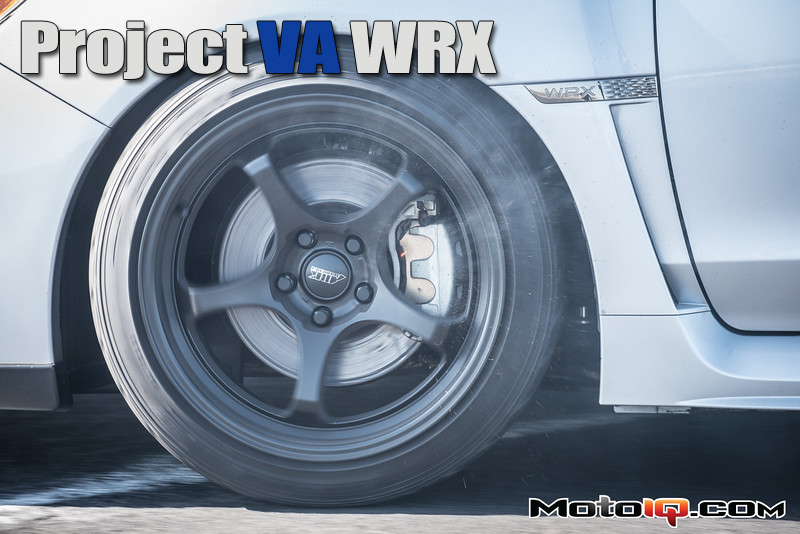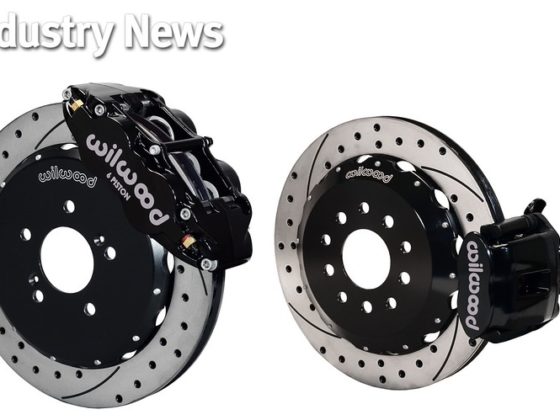
Project VA WRX: Upgrading the Brakes with StopTech Part 1, Getting a Baseline
Our Project VA WRX does not have the trick Brembo brakes that come standard on its big brother the STI. It does however have brakes that would have been considered to be great just a few short years ago. Although the front and rear calipers appear to be pedestrian sliding calipers with two pistons on the front and a single piston for the rear brakes, the rotors are big. The front rotors measure in at 316mm in diameter and 28mm thick while the rear rotors are 288mm in diameter and 8.5mm thick. The pads are also large for OEM type calipers.
The factory brakes are probably fine for your average guy and will probably work with the right pads on the track. However, like all things we touch, we are planning for more power and sticky tires. That and the fact that the WRX is a somewhat heavy for a compact car means that we will be pushing the limits of the stock brake system in no time.
As a coincidence, StopTech called and asked us if we would like to attend one of their development sessions to show us some of the testing they do to baseline stock cars and validate the engineering of their brake kits. We were eager to observe some of the dynamic testing and StopTech did in fact use our car as a test mule for their 4 wheel upgrade kit.
It's no secret that we are fans of StopTech. We have always felt that they have done a really good job of getting their brake systems to match the characteristics of the OEM hydraulic system. While other might simply make rotor hats and brackets to graft racing brakes onto production cars, StopTech engineers their systems with multiple pistons sizes for great pedal feel and perfect proportioning.
StopTech also does extensive validation to make sure the brakes function well and are compatibles with the factory ABS, traction and stability control systems. After fighting some or all of these issues with other big brake kits, we have found StopTech stuff to work as promised to reduce fade and shorten stopping distances.
Read on to see some of StopTech's testing as they do a baseline on our car before developing an awesome 4 wheel brake upgrade kit for it.
For more StopTech articles and tech data, stop by the StopTech Industry Partner page.
 The first thing that the StopTech engineers did on the test cars including ours is to set up a data system that uses GPS and accelerometer data to measure G's over time and stopping distances. This way performance data for stock and modified systems can be observed directly and overlayed to study even minute performance differences.
The first thing that the StopTech engineers did on the test cars including ours is to set up a data system that uses GPS and accelerometer data to measure G's over time and stopping distances. This way performance data for stock and modified systems can be observed directly and overlayed to study even minute performance differences. StopTech uses the Camarillo Municipal airport to perform their testing and always uses the same stretch of pavement so data from previous tests can be compared. Asphalt composition and even the grade and smoothness of the road can make for differences in data so having all testing done on the same pavement is helpful. The first test is to do ten 60-0 stops back to back. In between stops the car is driven back to the starting line at the same speed to maintain heat soak and make sure that the between stop cool down time is the same for all tests.
StopTech uses the Camarillo Municipal airport to perform their testing and always uses the same stretch of pavement so data from previous tests can be compared. Asphalt composition and even the grade and smoothness of the road can make for differences in data so having all testing done on the same pavement is helpful. The first test is to do ten 60-0 stops back to back. In between stops the car is driven back to the starting line at the same speed to maintain heat soak and make sure that the between stop cool down time is the same for all tests. After each stop, StopTech's engineers measure the rotor temperatures for the front wheels. A contact probe pyrometer is used to measure the temperatures.
After each stop, StopTech's engineers measure the rotor temperatures for the front wheels. A contact probe pyrometer is used to measure the temperatures.  The rear brake temperatures are also measured. The StopTech engineers rush to get the most accurate temperature as soon as the vehicle stops moving. The data is recorded by hand and will later be matched to the logged data. Driver comments are also noted. For the 60-0 stops, the stock brakes worked fine.
The rear brake temperatures are also measured. The StopTech engineers rush to get the most accurate temperature as soon as the vehicle stops moving. The data is recorded by hand and will later be matched to the logged data. Driver comments are also noted. For the 60-0 stops, the stock brakes worked fine.



